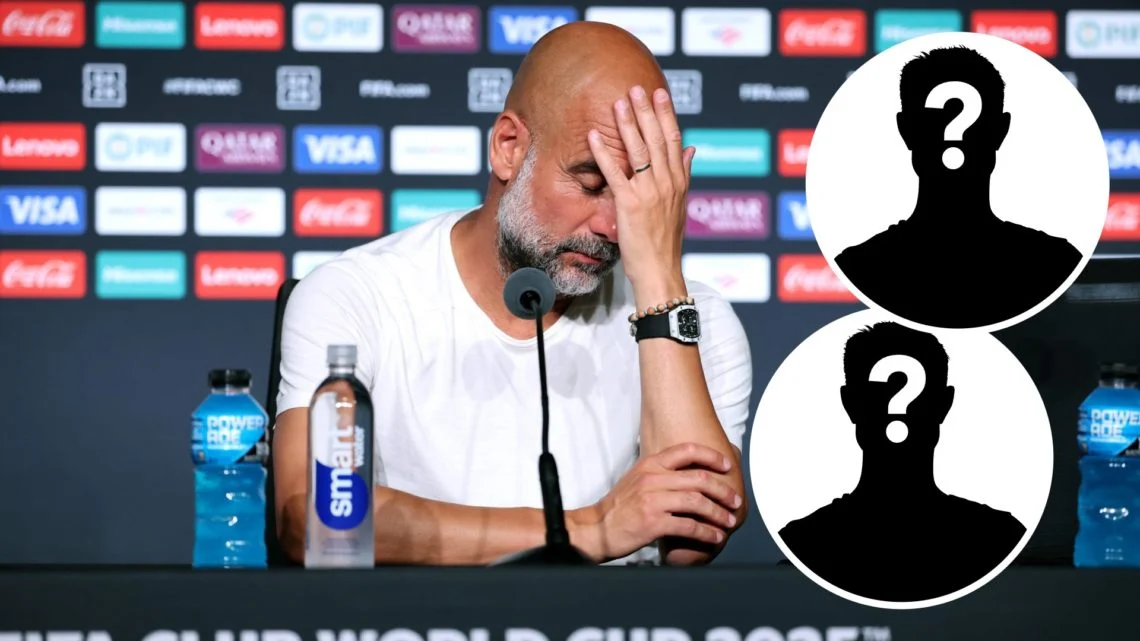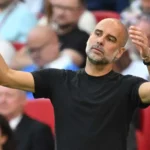Pundit says Man City have two players who may ‘never be good enough’ for Pep Guardiola

Manchester City finds itself at a crossroads as the Premier League prepares to resume in August. Despite Pep Guardiola’s tactical genius and the club’s recent successes, defensive frailties have emerged as a persistent thorn in the side of the Sky Blues. The recently concluded FIFA Club World Cup provided a stark reminder of these issues, as City’s elimination at the hands of Al-Hilal in the Round of 16 highlighted fundamental problems that have been plaguing the team throughout the 2024/25 campaign.
The defeat was particularly telling, not just because of the result, but because of how it unfolded. Bernardo Silva’s post-match frustration with the team’s defensive performance encapsulated the broader concerns that have been growing among fans, pundits, and the club hierarchy. Despite showing glimpses of their old brilliance during the Club World Cup, City’s inability to control transitions and maintain defensive solidity has become a recurring theme that threatens to undermine their ambitions for the upcoming season.
In an attempt to address these defensive concerns, Manchester City made a significant investment in their backline during the January transfer window. The arrivals of Abdukodir Khusanov and Vitor Reis were seen as strategic moves to bolster a defense that had shown vulnerability throughout the first half of the season. However, the integration of these young talents has proven to be far more challenging than anticipated.
The decision to bring in two relatively inexperienced defenders was always going to be a calculated risk. Guardiola’s philosophy of developing young players within his system has been well-documented throughout his career, but the immediate pressure of competing at the highest level while simultaneously nurturing talent creates a delicate balancing act. The early evidence suggests that this balance has been difficult to achieve, with both players struggling to adapt to the intensity and complexity of Guardiola’s tactical demands. Abdukodir Khusanov’s arrival at Manchester City represented a significant step up in his career, but the transition has been anything but smooth. The young defender was thrust into the deep end almost immediately upon his arrival, a decision that reflected both the club’s urgent need for defensive reinforcement and Guardiola’s belief in the player’s potential.
With ten appearances under his belt, Khusanov has managed to find the back of the net once, but his overall performance has been marked by inconsistency and the growing pains typical of a young player adapting to a new league and system. The 745 minutes he has accumulated on the pitch have provided valuable experience, but they have also exposed the gaps in his game that need addressing. The challenge for Khusanov lies not just in adapting to the Premier League’s physicality and pace, but also in understanding the intricate defensive patterns that Guardiola demands. City’s system requires defenders to be comfortable in possession, capable of playing out from the back, and intelligent enough to read the game at the highest level. These are skills that often take time to develop, particularly for a player who is still adjusting to the cultural and tactical differences of English football.
Vitor Reis’s situation presents a different set of challenges. With only four appearances and 226 minutes of playing time, the Brazilian defender has had limited opportunities to showcase his abilities. This lack of game time has inevitably led to questions about his readiness for the Premier League and whether the club’s investment in him will pay dividends in the short term. The scarcity of appearances for Reis reflects the competitive nature of Manchester City’s squad and the difficulty young players face in breaking into Guardiola’s first team. Unlike some clubs where young talents might be gradually integrated, City’s ambitions and expectations demand immediate performance levels that can be challenging for developing players to meet consistently.
Despite the limited playing time, those within the club remain optimistic about Reis’s potential. Ederson’s endorsement of the young defender, suggesting he could become one of the best defenders in the world, carries significant weight given the Brazilian goalkeeper’s experience and understanding of defensive play. However, potential must eventually translate into performance, and the upcoming season will be crucial in determining whether Reis can bridge that gap
The struggles of both Khusanov and Reis have not gone unnoticed by the football community. ESPN pundit Steve Nicol, a former Liverpool player with extensive experience in English football, has been particularly vocal about his concerns regarding the two signings. His assessment that the defenders “may never be good enough” for Manchester City represents a harsh but not uncommon critique of young players struggling to adapt to elite-level football.
Nicol’s criticism extends beyond the individual performances of the two defenders to encompass a broader concern about City’s defensive strategy. His observation about Matheus Nunes being deployed at right-back, and the comparison to Rayan Ait-Nouri, highlights the makeshift nature of some of City’s defensive solutions. This patchwork approach to solving defensive problems suggests a lack of clear, long-term planning that could have more serious implications for the team’s performance. The pundit’s assessment, while harsh, reflects a growing sentiment among observers that City’s defensive recruitment has been inconsistent. The club’s success in other areas of the pitch has perhaps masked some of the underlying issues in defense, but the scrutiny intensifies when results don’t meet expectations, as evidenced by the Club World Cup exit.
One of the most significant issues that has plagued Manchester City throughout the 2024/25 season has been their inability to control transitions effectively. This problem manifests in various ways: difficulty in moving from defense to attack smoothly, vulnerability during opponent counter-attacks, and a general lack of cohesion in the middle phases of play.
The transition game in modern football requires defenders who are not only solid in their defensive duties but also capable of initiating attacks and maintaining possession under pressure. This dual requirement places enormous demands on young defenders who are still learning the fundamentals of their defensive responsibilities. For Khusanov and Reis, mastering these transition phases represents perhaps the biggest challenge in their development.
The appointment of new coaches, including Pepijn Lijnders, was intended to address some of these tactical issues. However, the Club World Cup performances suggested that the problems run deeper than coaching alone can solve. The fundamental issue appears to be a mismatch between the tactical requirements of Guardiola’s system and the current capabilities of the available personnel. Despite the criticism and early struggles, Manchester City’s leadership remains committed to the development of both Khusanov and Reis. Chairman Khaldoon Al Mubarak’s public expression of faith in Khusanov’s potential reflects the club’s long-term vision and willingness to invest in young talent even when immediate returns are not guaranteed.
This institutional upport is crucial for young players navigating the pressures of elite football. The knowledge that the club hierarchy believes in their potential can provide the confidence and stability needed for players to develop their skills without the constant fear of being discarded at the first sign of struggle. The decision to retain both players for the upcoming season, rather than sending them out on loan, represents a significant statement of intent. This choice suggests that Guardiola and the coaching staff believe that the benefits of training and learning within the City system outweigh the potential advantages of regular playing time elsewhere.
Working under Pep Guardiola represents both an opportunity and a challenge for young defenders. The Spanish manager’s reputation for developing players is well-established, but his methods can be demanding and unforgiving. The tactical complexity of his system requires players to understand not just their own role but how their position fits into the broader tactical framework.
For Khusanov and Reis, the upcoming season will provide an extended period to absorb these tactical lessons. While they may not receive regular starting opportunities, the daily training sessions, tactical meetings, and occasional match appearances will contribute to their development in ways that might not be immediately visible but could prove crucial in the long term. The challenge lies in maintaining motivation and sharpness without regular competitive action. Both players will need to demonstrate patience and professionalism while continuing to work on their game, knowing that their opportunities may be limited but could be game-changing when they arise.
To understand the situation of Khusanov and Reis properly, it’s important to consider the broader context of young defender development in modern football. The Premier League, in particular, has become increasingly demanding for young players, with the pace and physicality of the game requiring rapid adaptation.
Many successful defenders have experienced similar struggles in their early careers before eventually establishing themselves at the highest level. The key difference often lies in the support system around the player and the patience of the club in allowing natural development to occur. Manchester City’s track record in developing young talent, while not perfect, includes several success stories that provide hope for the current situation. The financial investment in both players also suggests a long-term commitment that extends beyond immediate performance concerns. Modern football clubs, particularly those with City’s resources, increasingly view player development as a strategic investment rather than expecting immediate returns.
The struggles of Khusanov and Reis highlight broader questions about Manchester City’s defensive strategy and recruitment. The club’s approach to building defensive depth has been criticized for lacking cohesion and long-term planning. The reliance on makeshift solutions and the integration of young, unproven players into crucial positions suggest a reactive rather than proactive approach to team building.
This situation is particularly concerning given the defensive stability that characterized City’s most successful periods under Guardiola. The partnership between players like Vincent Kompany and Nicolas Otamendi, or later the emergence of Ruben Dias, provided the foundation for the team’s attacking freedom. The current uncertainty in defense threatens to undermine the entire tactical structure. The presence of established defenders like Dias and Josko Gvardiol provides some stability, but the depth and quality of defensive options remain questionable. The upcoming season will test whether the current squad composition can provide the defensive solidity needed for sustained success
The 2025/26 season represents a crucial period for both Abdukodir Khusanov and Vitor Reis. The extended time to adapt to Guardiola’s methods and the Premier League’s demands could prove beneficial, but the pressure to perform when opportunities arise will be intense.
For Khusanov, the challenge will be to build on his early experiences and demonstrate the consistency needed for regular selection. His goal-scoring ability suggests an attacking threat that could be valuable in Guardiola’s system, but defensive solidity must remain the priority. Reis faces the additional challenge of earning his first sustained run in the team. The limited playing time so far means that each appearance carries added significance, with little margin for error in establishing himself as a viable option for the coaching staff.
The debate surrounding Khusanov and Reis ultimately reflects broader questions about Manchester City’s approach to squad development and the balance between immediate success and long-term planning. Steve Nicol’s criticism, while harsh, raises valid concerns about whether the club’s current defensive strategy is sustainable.
However, writing off young players after limited opportunities seems premature, particularly given the complexity of adapting to Guardiola’s system and the Premier League’s demands. The upcoming season will provide a clearer picture of whether City’s faith in these young defenders is justified or whether more drastic measures are needed.
The resolution of this situation will likely depend on several factors: the players’ ability to develop and adapt, the patience of the coaching staff and supporters, and the overall performance of the team. If City can maintain their competitive edge while allowing these young players to develop, the investment may prove worthwhile. However, if defensive frailties continue to undermine the team’s ambitions, more immediate solutions may be necessary.
The story of Khusanov and Reis serves as a reminder of the challenges facing modern football clubs in balancing immediate success with long-term development. For Manchester City, the next few months will be crucial in determining whether this particular gamble pays off or whether a different approach is needed to address their defensive concerns.















